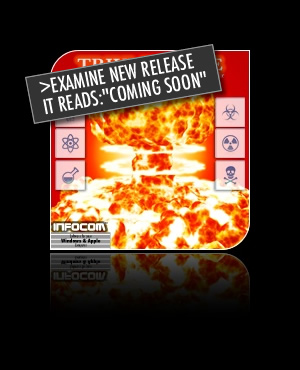Monthly Archives: February 2010
It's that time again. Boston IF Meetup at Nick Montfort's office at MIT, 14N-233. Tuesday, March 2, 6:30. After chatting and whatnot, we'll head over to the Cambridge Brewing Company for food and/or drink.
Two specific things we're likely to talk about:
- PAX East plans (PAX is less than a month away).
- The recently finished Jay Is Games IF competition (where our very own Andrew Plotkin tied for second!).
Tags: boston, if, interactive fiction, meetup.
This story has already guttered out, but the serious disassembly happened on Usenet where most people won't see it. So I will dedicate a few hectopixels to documenting the situation.
It began on Thursday, Feb 18th, when Jason Scott -- who should have known better -- posted:
GOOD LUCK, KID: http://www.infocom-fiction.com/ (from @textfiles on Twitter)
The caps were apparently insufficient sarcasm, as this drew a flood -- okay, a small backwash -- of "Oh my god Infocom returns could it be true!" posts, on Twitter and various gaming web forums.
Let us now consider the facts.
The infocom-fiction.com web site has the old Infocom logo, the tagline "Interactive Fiction revisited", and this promo image:
Exciting, huh? The image name implies a game called "Triumvirate", presumably a follow-up to Trinity.
Except, alpha, the web site is not new. It appears to have been registered in June of 2007, and it was last updated in July of 2007. That "coming soon" has been frozen for two and a half years now.
And beta, the web site is not owned by Activision. It's registered to a guy in Germany named Oliver Klaeffling. Now, I have no beef with some IF fan deciding to write a followup to Trinity. That's fanfic, and fanfic is cool. But you shouldn't start cheering for the logo on his web site; cheer for the work. And Klaeffling does not appear to have finished the work.
"But what about the trademark?" you ask. Okay, this is where the story gets -- not exactly interesting, but at least a little bit convoluted.
Activision bought Infocom in 1986. That included all the games and all the trademarks. However, they stopped using the Infocom label on new releases after Return to Zork in 1993. (Zork Nemesis and Grand Inquisitor were just labelled "Activision".) They continued to reprint the old text games as "Infocom" until 2002, and then they dropped it entirely.
I don't know exactly when the legal status shifted, but at some time after 2002, the "Infocom" trademark was up for grabs. (In contrast, Activision kept a firm grip on "Zork".)
In July of 2007, Oliver Klaeffling applied for the Infocom trademark. He had already registered the infocom-fiction.com domain, and he put up the image you see above. Then -- nothing. He never completed the trademark application process. The USPTO declared it "abandoned" in October 2008.
At almost the same time -- October 2007 -- another Infocom trademark application went in, this one by "Omni Consumer Products LLC". This is a deliberately silly company name, but it's a real (small) company. It consists of Pete Hottelet finding fictional products (such as "Brawndo" from Idiocracy) and getting permission make them as real (licensed) products.
So that's where the "Infocom" trademark is now: it's held by the maker of Brawndo. Take that as the character note of the 21st century, if you like. Hottelet does not appear to have to have done anything IF-related, but Dave Cornelson said he was emailing him about the trademark, and maybe something will come of that.
Where does this leave Klaeffling? He doesn't have a trademark, and Activision still owns the copyright on Trinity. In the past, Activision people have been generous about permitting free fan-made games in the Infocom settings. But I have no idea if those people are still at Activision. I also have no idea if Klaeffling intended to release his game for free or as a commercial product. Also, of course, I have no idea how far he got implementing it. Conclusion: I have no idea. But it's safe to say the game isn't coming out this month.
Footnotes: Thanks to Stuart Moore for posting facts rapidly on rec.arts.int-fiction. Also this handy trademark blog post from 2007.
Tags: if, infocom, reality check, trademarks.
 Two years after purchasing it (mostly because Portal was on the same disc), I have started regularly playing Team Fortress 2. My delay came from my general lack of enthusiasm about first-person shooters. My writing about it here comes from surprising insights about my own relationship with games that struck me soon after I began to play it.
Two years after purchasing it (mostly because Portal was on the same disc), I have started regularly playing Team Fortress 2. My delay came from my general lack of enthusiasm about first-person shooters. My writing about it here comes from surprising insights about my own relationship with games that struck me soon after I began to play it.
On the surface, TF2 is an intentionally silly online-only shooter where players, after choosing one of nine character classes, leap into a battle whose goal is one of the time-tested multiplayer FPS standards: capture the flag, king of the hill, or base attack/defense. Sometimes I mix it up with whichever random folks happen to be online when I'm feeling scrappy. My "real" games, though, occur on Sunday evenings with a group known as Clan Elysium who operate out of the web forum Geezer Gamers, a haven for grown-up Xbox Live fans. These times have proven to be some of the most fun I've ever had sitting on the couch with a controller in my hands, and friend, I'd logged a lot of hours under those conditions before this.
There have been three major effects of this experience. First of all, it's reignited my interest in online digital games, both as a player and a ludeaste, and led me to reconsider what kinds of video games deserve the treasure of my attention right now. It also threw some wood under Planbeast, the project I soft-launched last year and then all but ignored; a subsequent post I made to the Geezers' forum unexpectedly led to a small boom of use for that site, and I spent a happy week responding to bug reports that resulted in several significant improvements to the service.
But what I want to write about here comes from the surprising insight this game afforded me regarding the play style I favor, and what this teaches me about unexpected connections between very different kinds of games.
I know, I'm supposed to be all on top of Myst news. But I've slacked on this post, which is the post where I tell you that Myst Online is back online, totally free (but Cyan is accepting Paypal donations).
Everything takes longer than expected these days. Cyan Worlds' plans are to move MO:UL to open source, and we finally have some good news. We've taken a first step and started a MO:UL server, so the Ages of Uru are available again. We've opened all the Ages, and added most of the goodies in MO:UL. We're referring to it as MO:ULagain - feel free to explore and enjoy.
-- from Cyan's Play Myst Online page
Tags: cyan, it always grows back, myst, uru.
(Not a game post today, sorry... It's time for Zarf Wibbles About Apple Gadgets.)
What with the blizzard of iPad hype, everyone is talking about "multitasking" and how it is either a crucial tool of the Matrix infoconomy or a hideous, battery-destroying distraction from Getting Crap Done.
Irony shields to maximum, either way.
I just read through an essay, Understanding Multi-tasking on the iPad by Milind Alvares. It is a good overview but I think it oversimplifies to hit its target ("the hell with traditional multitasking", if I may summarize Alvares in five words).
"Multitasking" is a bunch of things, none of which is absolutely crucial, but none of which can be dismissed either. And some of them are stuck together. Let us then list:
- Software multitasking -- can several programs be running at a time?
- App multitasking -- can the user do something that involves several apps?
- User multitasking -- can the user do several things at once?
(The very word "multitasking" begs its question -- what "task" are we talking about, a human's or a computer's? -- but I'm using it for familiarity's (and Google's) sake.)
What do each of these things mean?
Tags: apple, ipad, iphone, multitasking, programming.
The 7th Casual Gameplay Design Competition, hosted by JayIsGames has just begun. That's thirty new short-form IF games, around the theme of "escape". All are playable online on the competition page.
This is one of the first big modern-IF events to occur outside the IF community. (The extended federation of IF communities, I should say, since there are many.) This comp has clearly gotten the attention of IF regulars; I see several familiar names on the game page -- Stephen Granade, Jim Aikin, Jim Munroe, among others -- as well as many who are entirely new to me. I am keen to find out both what the new authors are writing, and how the new players react to (what I think of as) the established talents of the field.
Voting is open for the next three weeks, and anyone can vote (you have to sign up). Enjoy.
Tags: if, jayiscomp, jayisgames.
You may have heard of Kickstarter. A number of independent game developers have used it to fund various projects. Here's another example, and I'll let Heather speak for herself:
Before You Close Your Eyes is a game/interactive story about personalitiesJust about 10 hours to go, and she's raised $8010 out of her $8500 goal (which represents 2 months of time to work on the game). And as with most Kickstarter projects, lots of fun gifts for pledges of various amounts.
and consequences. It is intended as an immersive, story-rich vehicle for
introspection and understanding the choices made by others. It is
presented in a Choose-Your-Own-Adventure style and will be available on
iPhone, Android and Web.
I am attempting to fund this project on Kickstarter, which is a cool web
platform for "crowdfunding". Crowdfunding is what happens when lots of
people are willing to put their money behind something that they love and
think should exist in the world. The Kickstarter model works a bit like a
PBS pledge drive. Backers declare how much they would like to contribute to
the project and receive 'Thank You" gifts that the person asking for funding
had defined.You can take a look at my project site here:
http://bit.ly/dreamgame
Tags: games, if, indie games, interactive fiction, kickstarter.
We took a little break in January, but we're back. All are welcome at the Boston Interactive Fiction Meetup on Monday, February 8, 6:30 PM, in Nick Montfort's office at MIT (14N-233). We have a few things on the agenda:
- We'll be discussing our participation in the upcoming PAX East.
- We'll be having a student present a prototype of a current work.
- We'll likely check out some of the entries in the Jay Is Games interactive fiction competition.
Tags: boston, if, interactive fiction, meetup.


